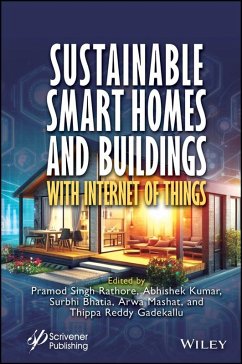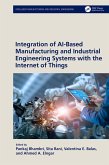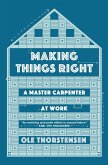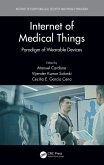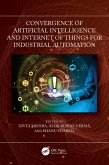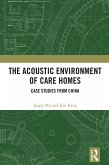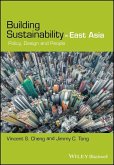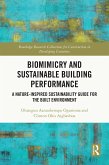Sustainable Smart Homes and Buildings with Internet of Things (eBook, ePUB)
Redaktion: Singh Rathore, Pramod; Gadekal, Thippa Reddy; Mashat, Arwa; Bhatia, Surbhi; Kumar, Abhishek
185,99 €
185,99 €
inkl. MwSt.
Sofort per Download lieferbar

0 °P sammeln
185,99 €
Als Download kaufen

185,99 €
inkl. MwSt.
Sofort per Download lieferbar

0 °P sammeln
Jetzt verschenken
Alle Infos zum eBook verschenken
185,99 €
inkl. MwSt.
Sofort per Download lieferbar
Alle Infos zum eBook verschenken

0 °P sammeln
Sustainable Smart Homes and Buildings with Internet of Things (eBook, ePUB)
Redaktion: Singh Rathore, Pramod; Gadekal, Thippa Reddy; Mashat, Arwa; Bhatia, Surbhi; Kumar, Abhishek
- Format: ePub
- Merkliste
- Auf die Merkliste
- Bewerten Bewerten
- Teilen
- Produkt teilen
- Produkterinnerung
- Produkterinnerung

Bitte loggen Sie sich zunächst in Ihr Kundenkonto ein oder registrieren Sie sich bei
bücher.de, um das eBook-Abo tolino select nutzen zu können.
Hier können Sie sich einloggen
Hier können Sie sich einloggen
Sie sind bereits eingeloggt. Klicken Sie auf 2. tolino select Abo, um fortzufahren.

Bitte loggen Sie sich zunächst in Ihr Kundenkonto ein oder registrieren Sie sich bei bücher.de, um das eBook-Abo tolino select nutzen zu können.
Written and edited by a team of experts in the field, this exciting new volume explores the real-world applications and methods for using Internet of Things (IoT) to make homes and buildings smart and sustainable and to continue working toward a "greener" world.
Sustainable Smart Homes and Buildings with Internet of Things (IoT) is a book that explores the integration of renewable energy sources and IoT technology in the design and management of smart homes and buildings. The book covers various topics related to the subject, including energy efficiency, real-time monitoring, control and…mehr
- Geräte: eReader
- mit Kopierschutz
- eBook Hilfe
- Größe: 10.63MB
Andere Kunden interessierten sich auch für
![Integration of AI-Based Manufacturing and Industrial Engineering Systems with the Internet of Things (eBook, ePUB) Integration of AI-Based Manufacturing and Industrial Engineering Systems with the Internet of Things (eBook, ePUB)]() Integration of AI-Based Manufacturing and Industrial Engineering Systems with the Internet of Things (eBook, ePUB)52,95 €
Integration of AI-Based Manufacturing and Industrial Engineering Systems with the Internet of Things (eBook, ePUB)52,95 €![Making Things Right (eBook, ePUB) Making Things Right (eBook, ePUB)]() Ole ThorstensenMaking Things Right (eBook, ePUB)3,99 €
Ole ThorstensenMaking Things Right (eBook, ePUB)3,99 €![Internet of Medical Things (eBook, ePUB) Internet of Medical Things (eBook, ePUB)]() Internet of Medical Things (eBook, ePUB)51,95 €
Internet of Medical Things (eBook, ePUB)51,95 €![Convergence of Artificial Intelligence and Internet of Things for Industrial Automation (eBook, ePUB) Convergence of Artificial Intelligence and Internet of Things for Industrial Automation (eBook, ePUB)]() Convergence of Artificial Intelligence and Internet of Things for Industrial Automation (eBook, ePUB)54,95 €
Convergence of Artificial Intelligence and Internet of Things for Industrial Automation (eBook, ePUB)54,95 €![The Acoustic Environment of Care Homes (eBook, ePUB) The Acoustic Environment of Care Homes (eBook, ePUB)]() Jingyi MuThe Acoustic Environment of Care Homes (eBook, ePUB)173,95 €
Jingyi MuThe Acoustic Environment of Care Homes (eBook, ePUB)173,95 €![Building Sustainability in East Asia (eBook, ePUB) Building Sustainability in East Asia (eBook, ePUB)]() Vincent S. ChengBuilding Sustainability in East Asia (eBook, ePUB)81,99 €
Vincent S. ChengBuilding Sustainability in East Asia (eBook, ePUB)81,99 €![Biomimicry and Sustainable Building Performance (eBook, ePUB) Biomimicry and Sustainable Building Performance (eBook, ePUB)]() Olusegun Aanuoluwapo OguntonaBiomimicry and Sustainable Building Performance (eBook, ePUB)178,95 €
Olusegun Aanuoluwapo OguntonaBiomimicry and Sustainable Building Performance (eBook, ePUB)178,95 €-
-
-
Written and edited by a team of experts in the field, this exciting new volume explores the real-world applications and methods for using Internet of Things (IoT) to make homes and buildings smart and sustainable and to continue working toward a "greener" world.
Sustainable Smart Homes and Buildings with Internet of Things (IoT) is a book that explores the integration of renewable energy sources and IoT technology in the design and management of smart homes and buildings. The book covers various topics related to the subject, including energy efficiency, real-time monitoring, control and optimization of renewable energy sources, smart grid integration, energy storage systems, and microgrids.
The book explains how IoT technology can be used to collect data from various sensors and devices installed in smart homes and buildings to create a real-time monitoring and control system for renewable energy sources, which can help optimize energy usage and reduce waste. It also discusses the challenges and opportunities associated with the integration of renewable energy sources in smart homes and buildings, and how these challenges can be addressed through the use of IoT technology.
The book is intended for architects, engineers, building managers, energy professionals, and researchers interested in the design and management of sustainable smart homes and buildings. It provides practical insights, case studies, and examples that illustrate the benefits of using renewable energy sources and IoT technology to create energy-efficient, environmentally friendly, and comfortable living spaces.
Sustainable Smart Homes and Buildings with Internet of Things (IoT) is a book that explores the integration of renewable energy sources and IoT technology in the design and management of smart homes and buildings. The book covers various topics related to the subject, including energy efficiency, real-time monitoring, control and optimization of renewable energy sources, smart grid integration, energy storage systems, and microgrids.
The book explains how IoT technology can be used to collect data from various sensors and devices installed in smart homes and buildings to create a real-time monitoring and control system for renewable energy sources, which can help optimize energy usage and reduce waste. It also discusses the challenges and opportunities associated with the integration of renewable energy sources in smart homes and buildings, and how these challenges can be addressed through the use of IoT technology.
The book is intended for architects, engineers, building managers, energy professionals, and researchers interested in the design and management of sustainable smart homes and buildings. It provides practical insights, case studies, and examples that illustrate the benefits of using renewable energy sources and IoT technology to create energy-efficient, environmentally friendly, and comfortable living spaces.
Dieser Download kann aus rechtlichen Gründen nur mit Rechnungsadresse in D ausgeliefert werden.
Produktdetails
- Produktdetails
- Verlag: Wiley
- Seitenzahl: 504
- Erscheinungstermin: 19. November 2024
- Englisch
- ISBN-13: 9781394231492
- Artikelnr.: 72263386
- Verlag: Wiley
- Seitenzahl: 504
- Erscheinungstermin: 19. November 2024
- Englisch
- ISBN-13: 9781394231492
- Artikelnr.: 72263386
- Herstellerkennzeichnung Die Herstellerinformationen sind derzeit nicht verfügbar.
Pramod Singh Rathore, MTech, is pursuing his doctorate in computer science from the University of Engineering and Management (UEM), Kolkata, India and is an assistant professor in the Department of Computer and Communication Engineering, Manipal University Jaipur. With over 11 years of academic teaching experience, he has published more than 55 papers in scientific journals, books, and conferences. He has co-authored and edited numerous books, including books from Scrivener Publishing. Abhishek Kumar, PhD, is a post-doctoral fellow in the Ingenium Research Group, Universidad De Castilla-La Mancha, Ciudad Real, and Ciudad Real, Spain. He has over nine years of academic experience and has published over 100 papers in scientific journals, books, and conferences. He has authored or coauthored six books published and edited 25 books, including books from Scrivener Publishing, and he has been the series editor for a number of book series. Surbhi Bhatia, PhD, is working in the Department of Department of Data Science, School of Science, Engineering and environment, University of Salford, Manchester, United Kingdom. She has over 11 years of academic and teaching experience and has published more than 100 papers in scientific journals. She has 12 patents to her credit and has written three books and edited ten books. Arwa Mashat, PhD, is an assistant professor in the Faculty of Computing and Information Technology in King Abdulaziz University Rabigh branch. She earned her PhD in instructional design and technology from Old Dominion University, Virginia, USA and has written two books. Thippa Reddy Gadekallu is currently with the Zhongda Group as Chief Engineer and in the School of Information Technology and Engineering, Vellore Institute of Technology, Vellore, India, as well as with the Department of Electrical and Computer Engineering, Lebanese American University, Byblos, Lebanon.
Preface xv
1 Development of a Framework to Integrate Smart Home and Energy Operation
Systems to Manage Energy Efficiency Through AI 1
Sasikala P., S. Sivakumar, Murali Kalipindi and Makhan Kumbhkar
1.1 Introduction 2
1.2 Research Idea Definitions 3
1.2.1 A Service for Intelligence Awareness 3
1.2.2 IAT Sensor 4
1.2.3 IAT Smartphone 5
1.2.4 IAT Smart Appliance 6
1.2.5 Service-Based Intelligence Energy Efficiency 7
1.2.6 Service Idea for Intelligence Target 8
1.3 Algorithms for Intelligent Models 9
1.3.1 Algorithm for IAT 9
1.3.2 Algorithm of IE2S 11
1.3.3 Algorithm for IST 11
1.4 Analyzing and Implementing 12
1.4.1 Sensory Things 12
1.4.2 Server 13
1.5 Conclusion 15
Bibliography 16
2 Development of a Hybrid System to Make the Decision and Optimization of
Renewable Energy Sources 19
M. Jayakrishna, S. Sivakumar, Nalam Chandra Sekhar and Yabesh Abraham
Durairaj Isravel
2.1 Introduction 20
2.2 Related Work 20
2.3 Methods of Modelling 22
2.3.1 Designing a Hybrid Energy Infrastructure 22
2.3.2 Modelling Web-Based SCADA Systems 22
2.4 Methodology 24
2.4.1 A Simulated Model 24
2.4.1.1 Model Experiment 26
2.5 Discussion and Result 27
2.6 Conclusion 31
Bibliography 32
3 IoT-Based Renewable Energy Management Systems in Apartment 35
Thulasi Bikku, S. Sivakumar, Sudha Arogya Mary Chinthamani and Pramoda
Patro
3.1 Introduction 36
3.2 Smart House Design Using Internet of Things 38
3.3 Problem Statement 41
3.4 The Proposed Methodology 42
3.5 A Mathematical Framework 42
3.5.1 Grid Model for Electricity 43
3.5.2 Energy-Use Model 44
3.5.3 Pricing Energy 45
3.5.4 Demand-Reply Paradigm 45
3.6 Optimize Design 46
3.6.1 Objectives and Restrictions 46
3.7 Discussion and Results 47
3.7.1 The Provided Data 47
3.8 Conclusion 48
References 50
4 Framework of IoT-Based Meta Firewall System to Plan the Renewable Energy
Consumption in Smart Homes or Buildings 53
Mandeep Kaur Ghumman, A. Vinay Bhushan, Chetan Khemraj Lanjewar and
Abhishek Choubey
4.1 Introduction 54
4.1.1 Green Home 57
4.1.2 Green Dorms 58
4.2 Problem Formulation and System Model 58
4.2.1 System Design 58
4.2.2 The Research Goal 58
4.2.2.1 Comfort Error 59
4.2.2.2 Consumption of Energy 59
4.2.2.3 Co 2 Emissions 59
4.2.3 Baseline Methods 59
4.3 Meta-Control Firewall Plus (IMCF+) 60
4.3.1 Operation Summary 60
4.3.2 Procedure for Amortization 61
4.3.3 Algorithm for Green Plan (GP) 61
4.3.4 Analysis of Performance 63
4.4 Architecture of the IMCF+ System 63
4.4.1 A System Architecture 63
4.4.2 Graphical User Interface 65
4.5 Trial Methods and Assessment 66
4.5.1 Methods 66
4.5.1.1 Datasets 66
4.5.2 Evaluations of IMCF+ 67
4.5.2.1 Evaluation of Households 67
4.5.2.2 Evaluation of University Campus 69
4.5.2.3 Hotel Apartment Evaluation 70
4.5.3 Series of Micro-Benchmarks 70
4.5.3.1 Series-1: Evaluation of Performance 70
4.5.3.2 Series-2: K-Opt Assess 71
4.5.3.3 Series-3: Evaluation of Initialization 72
4.5.3.4 Series-4: Studying Energy Conservation 72
4.6 Conclusion 73
Bibliography 74
5 Manage and Optimization of Renewable Energy Consumption Efficiency for
Smart Homes 77
Thulasi Bikku, V.O. Kavitha, Chetan Khemraj Lanjewar and Abhishek Choubey
5.1 Introduction 78
5.2 Proposed Method 82
5.2.1 Preprocessing 82
5.2.2 Forecasting 84
5.2.3 Optimization 86
5.3 Results 88
5.3.1 Testing Environment 88
5.3.2 Dataset 88
5.3.3 Assessment 89
5.3.3.1 Preprocessing 89
5.3.3.2 Forecast 90
5.3.3.3 Optimization 90
5.4 Discussion 92
5.5 Conclusion 93
References 93
6 Cost and Renewable Energy Management by IoT-Oriented Smart Home Based on
Smart Grid Demand Response 97
Omprakash B., Jatinkumar Patel, Dhanaselvam J. and Shruti Bhargava Choubey
6.1 Introduction 98
6.2 Methodology 99
6.2.1 Edge MCU 100
6.2.2 Pro Mini Arduino 101
6.2.3 Measurement of Current and Voltage 102
6.2.4 Blynk, A Creator of Interfaces for iOS and Android Platforms 104
6.3 System Design 104
6.4 Results 107
6.5 Conclusion 110
Bibliography 112
7 IoT-Based Smart Green Building Energy Management System 115
Rahama Salman, Ghada Elkady, Mukta Sandhu and Sandeep Gupta
7.1 Introduction 116
7.2 Methodology 118
7.3 Results of Construction 121
7.3.1 Hypotheses 121
7.3.2 DPM Data Creation 121
7.3.3 Room Power Management (Face Recognition), Power-Cut Feature 122
7.4 Working Model 123
7.4.1 Short-Term Load Forecasting (RT-STLF): Five Primary Blocks Make Up
the RT-STLF 123
7.4.2 Manage Room Power 125
7.4.3 IoT Data Update 126
7.5 Results of Testing 126
7.5.1 Face Recognition (Classification) Accuracy 126
7.5.2 Forecasting Methodologies Comparison 128
7.6 Conclusion 130
References 130
8 The Framework of IoT-Based Paradigms to Renewable Power Utilization and
Distribution by Microgrid 133
Kannan Kaliappan, Basi Reddy A., D. Muthukumaran, Gopinath S., T. Aditya
Sai Srinivas and R. Senthamil Selvan
8.1 Introduction 134
8.2 Related Work 135
8.3 Intelligent Power System Design 137
8.3.1 Connected Devices Network 138
8.3.1.1 Methods of Processing and Computing 139
8.3.1.2 Capacity for Storage 139
8.3.1.3 Optimizing Energy Use in Microgrids 140
8.4 Daily External Energy Requirements 145
8.4.1 Factory Robots 145
8.4.2 The Topic of Discussion Pertains to Domestic or Home Robots 146
8.4.3 Robotic Doctors 146
8.5 Conclusion 146
Bibliography 147
9 Machine Learning-Based Swarm Optimization for Residential Demand-Based
Electricity 149
Yalamanchili Salini, Kiran Sree Pokkuluri, D. Deepa and Mary Joseph
9.1 Introduction 150
9.2 Relevant Works 150
9.3 The Motivation 152
9.4 Energy Optimization Proposal 153
9.4.1 Appliance Scheduling Problem Formulation 156
9.4.2 Problem of Optimization 156
9.5 Discussions and Results 158
9.6 Conclusion 163
References 163
10 Integration of Intelligent System and Big Data Environment to Find the
Energy Utilization in Smart Public Buildings 167
Sushil Bhardwaj, Bharath Sampath, Latifjon Kosimov and Shakhlokhon Kosimova
10.1 Introduction 168
10.2 Methods and Materials 169
10.2.1 Data 169
10.2.2 Methods 170
10.2.2.1 Data Collection/Preprocessing Methods 170
10.2.2.2 Predictive Modelling Techniques 171
10.3 Results 174
10.3.1 Energy Consumption Results Using ML Systems 174
10.3.2 Design of an Intelligent Energy Management System Architecture 177
10.4 Discussions 180
10.4.1 Theory Contributions 182
10.4.2 Practice Implications 183
10.4.3 Research Limitations and Direction 183
10.5 Conclusion 184
Bibliography 185
11 Multi-Objective Optimization Process to Analyze the Renewable Energy
Storage and Distribution System from the Grid 187
Dinesh G., Manisha G., Dina Allam and Ghada Elkady
11.1 Introduction 188
11.2 Review of Literature 189
11.3 Work Proposal 192
11.4 Results and Discussion 195
11.5 Conclusion 200
References 200
12 Deep Learning and Multi-Horizontal Solar Energy Forecasting of Different
Weather Conditions in Smart Cities 203
Pradosh Kumar Sharma, M. V. Kesava Kumar, Mohd Wazih Ahmad and Radhika M.
12.1 Introduction 204
12.2 Description of Data 206
12.2.1 Information About Photovoltaic Production 207
12.2.2 Weather Information from the CWB 207
12.2.3 AccuWeather Reports 208
12.2.4 Local Weather Position/Pyrheliometer 208
12.3 Information Preparation 209
12.3.1 Classifying Data 209
12.3.2 Encryption of Data 210
12.4 Procedures and Assessment 212
12.4.1 Artificial Neural Network 212
12.4.2 Long Short-Term Memory 212
12.4.3 Gated Recurrent Unit 213
12.5 Results 213
12.5.1 Findings from Hyperparameter Tuning 213
12.5.2 Different Weather Data Groups' Forecast Performance 214
12.6 Conclusion 216
Bibliography 217
13 Machine Learning Models are Used to Analyze the Effectiveness of Daily
Residential Area Energy Consumption 221
Kapil Aggarwal, D. M. Kalai Selvi, Vijay Kumar Rayabharapu and K. S.
Chakradhar
13.1 Introduction 222
13.2 Intelligent Energy Systems for the House 223
13.2.1 Tracking 223
13.2.2 Management 223
13.2.3 Leadership 224
13.2.4 Recording 224
13.3 Advanced Plan for Demand Response 224
13.4 Results 228
13.5 Conclusion 231
Bibliography 232
14 Integration of AI and IoT Used to Manage and Secure the Renewable Energy
Management in the Environment 235
R. Swathi, M. Prabha, Ravichandran Sekar, Basi Reddy A., T. Aditya Sai
Srinivas and R. Senthamil Selvan
14.1 Introduction 236
14.1.1 Efforts 237
14.2 Smart IoT Device Setting Out and Energy-Saving Equipment 238
14.2.1 Smart IoT Deployment 238
14.2.2 Relevant Work 240
14.3 Key AI-Based Energy-Efficient Network Issues 240
14.3.1 Energy from Renewable Sources 241
14.3.2 AI Technology 242
14.3.2.1 Algorithm Regression 243
14.3.2.2 Neural Networks 244
14.3.2.3 SVM Algorithm 244
14.3.2.4 Analysis Clusters 245
14.3.2.5 Suggest Algorithm 245
14.4 AI-Based Managing Framework for Multidimensional Smart IoT Devices 245
14.4.1 Logistic Regression/Clustering Analysis Interlayer 246
14.4.1.1 Logistic Regression Interlayer 246
14.4.1.2 Clustering-Analysis Interlayer 247
14.4.2 Regression-Based Intra-Layer Control 248
14.4.3 Pushing and Caching with Recommendation Procedure 249
14.5 Research Futures 249
14.6 Conclusion 250
References 251
15 Hybrid Genetic Optimization and Particle Swarm Optimization for Enhanced
Electricity Demand Forecasting Using Artificial Neural Networks 253
V. Sharmila, Gaikar Vilas B., Rajiv Nayan and Pavithra G.
15.1 Introduction 254
15.2 Electricity Sector 255
15.3 Methodology 257
15.3.1 ANN Method 257
15.3.2 Particle Swarm Optimization (PSO) 257
15.4 ANN-GA-PSO Methods 260
15.4.1 Estimating Two Forms Method 260
15.4.2 Algorithm for Hybrid Optimization using GA-PSO 261
15.4.3 Data Management and Computation 261
15.4.4 Forecast Performance Evaluation 261
15.5 Results 262
15.5.1 Future Estimation 264
15.5.2 The Correlation Between Gross Domestic Product (GDP) and the
Electricity Demand 266
15.6 Conclusion 266
References 267
16 Harmonizing Renewable Energy, IoT, and Economic Prosperity: A
Multifaceted Analysis 271
Sri Silpa Padmanabhuni, Pradeep K. G. M., Sai Pallavi Akkisetti and G.
Jayalaxmi
16.1 Introduction 272
16.1.1 Designing of Smart Home Models 273
16.1.2 Prediction of Electricity from Smart Home Models 276
16.2 Literature Survey 278
16.3 Proposed Methodology 284
16.4 Conclusion 287
References 288
17 An Optimized Demand for Cost and Environment Benefits Towards Smart
Residentials Using IOT and Machine Learning 291
Hemlata and Manish Rai
17.1 Introduction 292
17.1.1 Overview of Smart-Based Systems 292
17.1.2 Benefits of Machine-Based Learning Algorithms in Smart-Based Systems
293
17.1.3 Challenges and Limitations of Machine-Based Learning Algorithms in
Smart-Based Systems 293
17.1.4 Real-World Applications of Machine-Based Learning Algorithms in
Smart-Based Systems 294
17.2 Literature Review 294
17.3 Key Considerations for Implementing Machine-Based Learning Algorithms
in Smart-Based Systems 302
Conclusion 304
References 305
18 IoT-Enabled RBFNN MPPT Algorithm for High Gain SEPIC Converter in
Grid-Tied Rooftop PV Applications 309
Thomas Thangam, P. Kavitha, P. Nammalvar, D. Karthikeyan and V. Pujari
18.1 Introduction 310
18.2 Related Works 311
18.3 Proposed System 312
18.4 Results and Discussion 318
18.5 Conclusion 321
References 324
Index 327
1 Development of a Framework to Integrate Smart Home and Energy Operation
Systems to Manage Energy Efficiency Through AI 1
Sasikala P., S. Sivakumar, Murali Kalipindi and Makhan Kumbhkar
1.1 Introduction 2
1.2 Research Idea Definitions 3
1.2.1 A Service for Intelligence Awareness 3
1.2.2 IAT Sensor 4
1.2.3 IAT Smartphone 5
1.2.4 IAT Smart Appliance 6
1.2.5 Service-Based Intelligence Energy Efficiency 7
1.2.6 Service Idea for Intelligence Target 8
1.3 Algorithms for Intelligent Models 9
1.3.1 Algorithm for IAT 9
1.3.2 Algorithm of IE2S 11
1.3.3 Algorithm for IST 11
1.4 Analyzing and Implementing 12
1.4.1 Sensory Things 12
1.4.2 Server 13
1.5 Conclusion 15
Bibliography 16
2 Development of a Hybrid System to Make the Decision and Optimization of
Renewable Energy Sources 19
M. Jayakrishna, S. Sivakumar, Nalam Chandra Sekhar and Yabesh Abraham
Durairaj Isravel
2.1 Introduction 20
2.2 Related Work 20
2.3 Methods of Modelling 22
2.3.1 Designing a Hybrid Energy Infrastructure 22
2.3.2 Modelling Web-Based SCADA Systems 22
2.4 Methodology 24
2.4.1 A Simulated Model 24
2.4.1.1 Model Experiment 26
2.5 Discussion and Result 27
2.6 Conclusion 31
Bibliography 32
3 IoT-Based Renewable Energy Management Systems in Apartment 35
Thulasi Bikku, S. Sivakumar, Sudha Arogya Mary Chinthamani and Pramoda
Patro
3.1 Introduction 36
3.2 Smart House Design Using Internet of Things 38
3.3 Problem Statement 41
3.4 The Proposed Methodology 42
3.5 A Mathematical Framework 42
3.5.1 Grid Model for Electricity 43
3.5.2 Energy-Use Model 44
3.5.3 Pricing Energy 45
3.5.4 Demand-Reply Paradigm 45
3.6 Optimize Design 46
3.6.1 Objectives and Restrictions 46
3.7 Discussion and Results 47
3.7.1 The Provided Data 47
3.8 Conclusion 48
References 50
4 Framework of IoT-Based Meta Firewall System to Plan the Renewable Energy
Consumption in Smart Homes or Buildings 53
Mandeep Kaur Ghumman, A. Vinay Bhushan, Chetan Khemraj Lanjewar and
Abhishek Choubey
4.1 Introduction 54
4.1.1 Green Home 57
4.1.2 Green Dorms 58
4.2 Problem Formulation and System Model 58
4.2.1 System Design 58
4.2.2 The Research Goal 58
4.2.2.1 Comfort Error 59
4.2.2.2 Consumption of Energy 59
4.2.2.3 Co 2 Emissions 59
4.2.3 Baseline Methods 59
4.3 Meta-Control Firewall Plus (IMCF+) 60
4.3.1 Operation Summary 60
4.3.2 Procedure for Amortization 61
4.3.3 Algorithm for Green Plan (GP) 61
4.3.4 Analysis of Performance 63
4.4 Architecture of the IMCF+ System 63
4.4.1 A System Architecture 63
4.4.2 Graphical User Interface 65
4.5 Trial Methods and Assessment 66
4.5.1 Methods 66
4.5.1.1 Datasets 66
4.5.2 Evaluations of IMCF+ 67
4.5.2.1 Evaluation of Households 67
4.5.2.2 Evaluation of University Campus 69
4.5.2.3 Hotel Apartment Evaluation 70
4.5.3 Series of Micro-Benchmarks 70
4.5.3.1 Series-1: Evaluation of Performance 70
4.5.3.2 Series-2: K-Opt Assess 71
4.5.3.3 Series-3: Evaluation of Initialization 72
4.5.3.4 Series-4: Studying Energy Conservation 72
4.6 Conclusion 73
Bibliography 74
5 Manage and Optimization of Renewable Energy Consumption Efficiency for
Smart Homes 77
Thulasi Bikku, V.O. Kavitha, Chetan Khemraj Lanjewar and Abhishek Choubey
5.1 Introduction 78
5.2 Proposed Method 82
5.2.1 Preprocessing 82
5.2.2 Forecasting 84
5.2.3 Optimization 86
5.3 Results 88
5.3.1 Testing Environment 88
5.3.2 Dataset 88
5.3.3 Assessment 89
5.3.3.1 Preprocessing 89
5.3.3.2 Forecast 90
5.3.3.3 Optimization 90
5.4 Discussion 92
5.5 Conclusion 93
References 93
6 Cost and Renewable Energy Management by IoT-Oriented Smart Home Based on
Smart Grid Demand Response 97
Omprakash B., Jatinkumar Patel, Dhanaselvam J. and Shruti Bhargava Choubey
6.1 Introduction 98
6.2 Methodology 99
6.2.1 Edge MCU 100
6.2.2 Pro Mini Arduino 101
6.2.3 Measurement of Current and Voltage 102
6.2.4 Blynk, A Creator of Interfaces for iOS and Android Platforms 104
6.3 System Design 104
6.4 Results 107
6.5 Conclusion 110
Bibliography 112
7 IoT-Based Smart Green Building Energy Management System 115
Rahama Salman, Ghada Elkady, Mukta Sandhu and Sandeep Gupta
7.1 Introduction 116
7.2 Methodology 118
7.3 Results of Construction 121
7.3.1 Hypotheses 121
7.3.2 DPM Data Creation 121
7.3.3 Room Power Management (Face Recognition), Power-Cut Feature 122
7.4 Working Model 123
7.4.1 Short-Term Load Forecasting (RT-STLF): Five Primary Blocks Make Up
the RT-STLF 123
7.4.2 Manage Room Power 125
7.4.3 IoT Data Update 126
7.5 Results of Testing 126
7.5.1 Face Recognition (Classification) Accuracy 126
7.5.2 Forecasting Methodologies Comparison 128
7.6 Conclusion 130
References 130
8 The Framework of IoT-Based Paradigms to Renewable Power Utilization and
Distribution by Microgrid 133
Kannan Kaliappan, Basi Reddy A., D. Muthukumaran, Gopinath S., T. Aditya
Sai Srinivas and R. Senthamil Selvan
8.1 Introduction 134
8.2 Related Work 135
8.3 Intelligent Power System Design 137
8.3.1 Connected Devices Network 138
8.3.1.1 Methods of Processing and Computing 139
8.3.1.2 Capacity for Storage 139
8.3.1.3 Optimizing Energy Use in Microgrids 140
8.4 Daily External Energy Requirements 145
8.4.1 Factory Robots 145
8.4.2 The Topic of Discussion Pertains to Domestic or Home Robots 146
8.4.3 Robotic Doctors 146
8.5 Conclusion 146
Bibliography 147
9 Machine Learning-Based Swarm Optimization for Residential Demand-Based
Electricity 149
Yalamanchili Salini, Kiran Sree Pokkuluri, D. Deepa and Mary Joseph
9.1 Introduction 150
9.2 Relevant Works 150
9.3 The Motivation 152
9.4 Energy Optimization Proposal 153
9.4.1 Appliance Scheduling Problem Formulation 156
9.4.2 Problem of Optimization 156
9.5 Discussions and Results 158
9.6 Conclusion 163
References 163
10 Integration of Intelligent System and Big Data Environment to Find the
Energy Utilization in Smart Public Buildings 167
Sushil Bhardwaj, Bharath Sampath, Latifjon Kosimov and Shakhlokhon Kosimova
10.1 Introduction 168
10.2 Methods and Materials 169
10.2.1 Data 169
10.2.2 Methods 170
10.2.2.1 Data Collection/Preprocessing Methods 170
10.2.2.2 Predictive Modelling Techniques 171
10.3 Results 174
10.3.1 Energy Consumption Results Using ML Systems 174
10.3.2 Design of an Intelligent Energy Management System Architecture 177
10.4 Discussions 180
10.4.1 Theory Contributions 182
10.4.2 Practice Implications 183
10.4.3 Research Limitations and Direction 183
10.5 Conclusion 184
Bibliography 185
11 Multi-Objective Optimization Process to Analyze the Renewable Energy
Storage and Distribution System from the Grid 187
Dinesh G., Manisha G., Dina Allam and Ghada Elkady
11.1 Introduction 188
11.2 Review of Literature 189
11.3 Work Proposal 192
11.4 Results and Discussion 195
11.5 Conclusion 200
References 200
12 Deep Learning and Multi-Horizontal Solar Energy Forecasting of Different
Weather Conditions in Smart Cities 203
Pradosh Kumar Sharma, M. V. Kesava Kumar, Mohd Wazih Ahmad and Radhika M.
12.1 Introduction 204
12.2 Description of Data 206
12.2.1 Information About Photovoltaic Production 207
12.2.2 Weather Information from the CWB 207
12.2.3 AccuWeather Reports 208
12.2.4 Local Weather Position/Pyrheliometer 208
12.3 Information Preparation 209
12.3.1 Classifying Data 209
12.3.2 Encryption of Data 210
12.4 Procedures and Assessment 212
12.4.1 Artificial Neural Network 212
12.4.2 Long Short-Term Memory 212
12.4.3 Gated Recurrent Unit 213
12.5 Results 213
12.5.1 Findings from Hyperparameter Tuning 213
12.5.2 Different Weather Data Groups' Forecast Performance 214
12.6 Conclusion 216
Bibliography 217
13 Machine Learning Models are Used to Analyze the Effectiveness of Daily
Residential Area Energy Consumption 221
Kapil Aggarwal, D. M. Kalai Selvi, Vijay Kumar Rayabharapu and K. S.
Chakradhar
13.1 Introduction 222
13.2 Intelligent Energy Systems for the House 223
13.2.1 Tracking 223
13.2.2 Management 223
13.2.3 Leadership 224
13.2.4 Recording 224
13.3 Advanced Plan for Demand Response 224
13.4 Results 228
13.5 Conclusion 231
Bibliography 232
14 Integration of AI and IoT Used to Manage and Secure the Renewable Energy
Management in the Environment 235
R. Swathi, M. Prabha, Ravichandran Sekar, Basi Reddy A., T. Aditya Sai
Srinivas and R. Senthamil Selvan
14.1 Introduction 236
14.1.1 Efforts 237
14.2 Smart IoT Device Setting Out and Energy-Saving Equipment 238
14.2.1 Smart IoT Deployment 238
14.2.2 Relevant Work 240
14.3 Key AI-Based Energy-Efficient Network Issues 240
14.3.1 Energy from Renewable Sources 241
14.3.2 AI Technology 242
14.3.2.1 Algorithm Regression 243
14.3.2.2 Neural Networks 244
14.3.2.3 SVM Algorithm 244
14.3.2.4 Analysis Clusters 245
14.3.2.5 Suggest Algorithm 245
14.4 AI-Based Managing Framework for Multidimensional Smart IoT Devices 245
14.4.1 Logistic Regression/Clustering Analysis Interlayer 246
14.4.1.1 Logistic Regression Interlayer 246
14.4.1.2 Clustering-Analysis Interlayer 247
14.4.2 Regression-Based Intra-Layer Control 248
14.4.3 Pushing and Caching with Recommendation Procedure 249
14.5 Research Futures 249
14.6 Conclusion 250
References 251
15 Hybrid Genetic Optimization and Particle Swarm Optimization for Enhanced
Electricity Demand Forecasting Using Artificial Neural Networks 253
V. Sharmila, Gaikar Vilas B., Rajiv Nayan and Pavithra G.
15.1 Introduction 254
15.2 Electricity Sector 255
15.3 Methodology 257
15.3.1 ANN Method 257
15.3.2 Particle Swarm Optimization (PSO) 257
15.4 ANN-GA-PSO Methods 260
15.4.1 Estimating Two Forms Method 260
15.4.2 Algorithm for Hybrid Optimization using GA-PSO 261
15.4.3 Data Management and Computation 261
15.4.4 Forecast Performance Evaluation 261
15.5 Results 262
15.5.1 Future Estimation 264
15.5.2 The Correlation Between Gross Domestic Product (GDP) and the
Electricity Demand 266
15.6 Conclusion 266
References 267
16 Harmonizing Renewable Energy, IoT, and Economic Prosperity: A
Multifaceted Analysis 271
Sri Silpa Padmanabhuni, Pradeep K. G. M., Sai Pallavi Akkisetti and G.
Jayalaxmi
16.1 Introduction 272
16.1.1 Designing of Smart Home Models 273
16.1.2 Prediction of Electricity from Smart Home Models 276
16.2 Literature Survey 278
16.3 Proposed Methodology 284
16.4 Conclusion 287
References 288
17 An Optimized Demand for Cost and Environment Benefits Towards Smart
Residentials Using IOT and Machine Learning 291
Hemlata and Manish Rai
17.1 Introduction 292
17.1.1 Overview of Smart-Based Systems 292
17.1.2 Benefits of Machine-Based Learning Algorithms in Smart-Based Systems
293
17.1.3 Challenges and Limitations of Machine-Based Learning Algorithms in
Smart-Based Systems 293
17.1.4 Real-World Applications of Machine-Based Learning Algorithms in
Smart-Based Systems 294
17.2 Literature Review 294
17.3 Key Considerations for Implementing Machine-Based Learning Algorithms
in Smart-Based Systems 302
Conclusion 304
References 305
18 IoT-Enabled RBFNN MPPT Algorithm for High Gain SEPIC Converter in
Grid-Tied Rooftop PV Applications 309
Thomas Thangam, P. Kavitha, P. Nammalvar, D. Karthikeyan and V. Pujari
18.1 Introduction 310
18.2 Related Works 311
18.3 Proposed System 312
18.4 Results and Discussion 318
18.5 Conclusion 321
References 324
Index 327
Preface xv
1 Development of a Framework to Integrate Smart Home and Energy Operation
Systems to Manage Energy Efficiency Through AI 1
Sasikala P., S. Sivakumar, Murali Kalipindi and Makhan Kumbhkar
1.1 Introduction 2
1.2 Research Idea Definitions 3
1.2.1 A Service for Intelligence Awareness 3
1.2.2 IAT Sensor 4
1.2.3 IAT Smartphone 5
1.2.4 IAT Smart Appliance 6
1.2.5 Service-Based Intelligence Energy Efficiency 7
1.2.6 Service Idea for Intelligence Target 8
1.3 Algorithms for Intelligent Models 9
1.3.1 Algorithm for IAT 9
1.3.2 Algorithm of IE2S 11
1.3.3 Algorithm for IST 11
1.4 Analyzing and Implementing 12
1.4.1 Sensory Things 12
1.4.2 Server 13
1.5 Conclusion 15
Bibliography 16
2 Development of a Hybrid System to Make the Decision and Optimization of
Renewable Energy Sources 19
M. Jayakrishna, S. Sivakumar, Nalam Chandra Sekhar and Yabesh Abraham
Durairaj Isravel
2.1 Introduction 20
2.2 Related Work 20
2.3 Methods of Modelling 22
2.3.1 Designing a Hybrid Energy Infrastructure 22
2.3.2 Modelling Web-Based SCADA Systems 22
2.4 Methodology 24
2.4.1 A Simulated Model 24
2.4.1.1 Model Experiment 26
2.5 Discussion and Result 27
2.6 Conclusion 31
Bibliography 32
3 IoT-Based Renewable Energy Management Systems in Apartment 35
Thulasi Bikku, S. Sivakumar, Sudha Arogya Mary Chinthamani and Pramoda
Patro
3.1 Introduction 36
3.2 Smart House Design Using Internet of Things 38
3.3 Problem Statement 41
3.4 The Proposed Methodology 42
3.5 A Mathematical Framework 42
3.5.1 Grid Model for Electricity 43
3.5.2 Energy-Use Model 44
3.5.3 Pricing Energy 45
3.5.4 Demand-Reply Paradigm 45
3.6 Optimize Design 46
3.6.1 Objectives and Restrictions 46
3.7 Discussion and Results 47
3.7.1 The Provided Data 47
3.8 Conclusion 48
References 50
4 Framework of IoT-Based Meta Firewall System to Plan the Renewable Energy
Consumption in Smart Homes or Buildings 53
Mandeep Kaur Ghumman, A. Vinay Bhushan, Chetan Khemraj Lanjewar and
Abhishek Choubey
4.1 Introduction 54
4.1.1 Green Home 57
4.1.2 Green Dorms 58
4.2 Problem Formulation and System Model 58
4.2.1 System Design 58
4.2.2 The Research Goal 58
4.2.2.1 Comfort Error 59
4.2.2.2 Consumption of Energy 59
4.2.2.3 Co 2 Emissions 59
4.2.3 Baseline Methods 59
4.3 Meta-Control Firewall Plus (IMCF+) 60
4.3.1 Operation Summary 60
4.3.2 Procedure for Amortization 61
4.3.3 Algorithm for Green Plan (GP) 61
4.3.4 Analysis of Performance 63
4.4 Architecture of the IMCF+ System 63
4.4.1 A System Architecture 63
4.4.2 Graphical User Interface 65
4.5 Trial Methods and Assessment 66
4.5.1 Methods 66
4.5.1.1 Datasets 66
4.5.2 Evaluations of IMCF+ 67
4.5.2.1 Evaluation of Households 67
4.5.2.2 Evaluation of University Campus 69
4.5.2.3 Hotel Apartment Evaluation 70
4.5.3 Series of Micro-Benchmarks 70
4.5.3.1 Series-1: Evaluation of Performance 70
4.5.3.2 Series-2: K-Opt Assess 71
4.5.3.3 Series-3: Evaluation of Initialization 72
4.5.3.4 Series-4: Studying Energy Conservation 72
4.6 Conclusion 73
Bibliography 74
5 Manage and Optimization of Renewable Energy Consumption Efficiency for
Smart Homes 77
Thulasi Bikku, V.O. Kavitha, Chetan Khemraj Lanjewar and Abhishek Choubey
5.1 Introduction 78
5.2 Proposed Method 82
5.2.1 Preprocessing 82
5.2.2 Forecasting 84
5.2.3 Optimization 86
5.3 Results 88
5.3.1 Testing Environment 88
5.3.2 Dataset 88
5.3.3 Assessment 89
5.3.3.1 Preprocessing 89
5.3.3.2 Forecast 90
5.3.3.3 Optimization 90
5.4 Discussion 92
5.5 Conclusion 93
References 93
6 Cost and Renewable Energy Management by IoT-Oriented Smart Home Based on
Smart Grid Demand Response 97
Omprakash B., Jatinkumar Patel, Dhanaselvam J. and Shruti Bhargava Choubey
6.1 Introduction 98
6.2 Methodology 99
6.2.1 Edge MCU 100
6.2.2 Pro Mini Arduino 101
6.2.3 Measurement of Current and Voltage 102
6.2.4 Blynk, A Creator of Interfaces for iOS and Android Platforms 104
6.3 System Design 104
6.4 Results 107
6.5 Conclusion 110
Bibliography 112
7 IoT-Based Smart Green Building Energy Management System 115
Rahama Salman, Ghada Elkady, Mukta Sandhu and Sandeep Gupta
7.1 Introduction 116
7.2 Methodology 118
7.3 Results of Construction 121
7.3.1 Hypotheses 121
7.3.2 DPM Data Creation 121
7.3.3 Room Power Management (Face Recognition), Power-Cut Feature 122
7.4 Working Model 123
7.4.1 Short-Term Load Forecasting (RT-STLF): Five Primary Blocks Make Up
the RT-STLF 123
7.4.2 Manage Room Power 125
7.4.3 IoT Data Update 126
7.5 Results of Testing 126
7.5.1 Face Recognition (Classification) Accuracy 126
7.5.2 Forecasting Methodologies Comparison 128
7.6 Conclusion 130
References 130
8 The Framework of IoT-Based Paradigms to Renewable Power Utilization and
Distribution by Microgrid 133
Kannan Kaliappan, Basi Reddy A., D. Muthukumaran, Gopinath S., T. Aditya
Sai Srinivas and R. Senthamil Selvan
8.1 Introduction 134
8.2 Related Work 135
8.3 Intelligent Power System Design 137
8.3.1 Connected Devices Network 138
8.3.1.1 Methods of Processing and Computing 139
8.3.1.2 Capacity for Storage 139
8.3.1.3 Optimizing Energy Use in Microgrids 140
8.4 Daily External Energy Requirements 145
8.4.1 Factory Robots 145
8.4.2 The Topic of Discussion Pertains to Domestic or Home Robots 146
8.4.3 Robotic Doctors 146
8.5 Conclusion 146
Bibliography 147
9 Machine Learning-Based Swarm Optimization for Residential Demand-Based
Electricity 149
Yalamanchili Salini, Kiran Sree Pokkuluri, D. Deepa and Mary Joseph
9.1 Introduction 150
9.2 Relevant Works 150
9.3 The Motivation 152
9.4 Energy Optimization Proposal 153
9.4.1 Appliance Scheduling Problem Formulation 156
9.4.2 Problem of Optimization 156
9.5 Discussions and Results 158
9.6 Conclusion 163
References 163
10 Integration of Intelligent System and Big Data Environment to Find the
Energy Utilization in Smart Public Buildings 167
Sushil Bhardwaj, Bharath Sampath, Latifjon Kosimov and Shakhlokhon Kosimova
10.1 Introduction 168
10.2 Methods and Materials 169
10.2.1 Data 169
10.2.2 Methods 170
10.2.2.1 Data Collection/Preprocessing Methods 170
10.2.2.2 Predictive Modelling Techniques 171
10.3 Results 174
10.3.1 Energy Consumption Results Using ML Systems 174
10.3.2 Design of an Intelligent Energy Management System Architecture 177
10.4 Discussions 180
10.4.1 Theory Contributions 182
10.4.2 Practice Implications 183
10.4.3 Research Limitations and Direction 183
10.5 Conclusion 184
Bibliography 185
11 Multi-Objective Optimization Process to Analyze the Renewable Energy
Storage and Distribution System from the Grid 187
Dinesh G., Manisha G., Dina Allam and Ghada Elkady
11.1 Introduction 188
11.2 Review of Literature 189
11.3 Work Proposal 192
11.4 Results and Discussion 195
11.5 Conclusion 200
References 200
12 Deep Learning and Multi-Horizontal Solar Energy Forecasting of Different
Weather Conditions in Smart Cities 203
Pradosh Kumar Sharma, M. V. Kesava Kumar, Mohd Wazih Ahmad and Radhika M.
12.1 Introduction 204
12.2 Description of Data 206
12.2.1 Information About Photovoltaic Production 207
12.2.2 Weather Information from the CWB 207
12.2.3 AccuWeather Reports 208
12.2.4 Local Weather Position/Pyrheliometer 208
12.3 Information Preparation 209
12.3.1 Classifying Data 209
12.3.2 Encryption of Data 210
12.4 Procedures and Assessment 212
12.4.1 Artificial Neural Network 212
12.4.2 Long Short-Term Memory 212
12.4.3 Gated Recurrent Unit 213
12.5 Results 213
12.5.1 Findings from Hyperparameter Tuning 213
12.5.2 Different Weather Data Groups' Forecast Performance 214
12.6 Conclusion 216
Bibliography 217
13 Machine Learning Models are Used to Analyze the Effectiveness of Daily
Residential Area Energy Consumption 221
Kapil Aggarwal, D. M. Kalai Selvi, Vijay Kumar Rayabharapu and K. S.
Chakradhar
13.1 Introduction 222
13.2 Intelligent Energy Systems for the House 223
13.2.1 Tracking 223
13.2.2 Management 223
13.2.3 Leadership 224
13.2.4 Recording 224
13.3 Advanced Plan for Demand Response 224
13.4 Results 228
13.5 Conclusion 231
Bibliography 232
14 Integration of AI and IoT Used to Manage and Secure the Renewable Energy
Management in the Environment 235
R. Swathi, M. Prabha, Ravichandran Sekar, Basi Reddy A., T. Aditya Sai
Srinivas and R. Senthamil Selvan
14.1 Introduction 236
14.1.1 Efforts 237
14.2 Smart IoT Device Setting Out and Energy-Saving Equipment 238
14.2.1 Smart IoT Deployment 238
14.2.2 Relevant Work 240
14.3 Key AI-Based Energy-Efficient Network Issues 240
14.3.1 Energy from Renewable Sources 241
14.3.2 AI Technology 242
14.3.2.1 Algorithm Regression 243
14.3.2.2 Neural Networks 244
14.3.2.3 SVM Algorithm 244
14.3.2.4 Analysis Clusters 245
14.3.2.5 Suggest Algorithm 245
14.4 AI-Based Managing Framework for Multidimensional Smart IoT Devices 245
14.4.1 Logistic Regression/Clustering Analysis Interlayer 246
14.4.1.1 Logistic Regression Interlayer 246
14.4.1.2 Clustering-Analysis Interlayer 247
14.4.2 Regression-Based Intra-Layer Control 248
14.4.3 Pushing and Caching with Recommendation Procedure 249
14.5 Research Futures 249
14.6 Conclusion 250
References 251
15 Hybrid Genetic Optimization and Particle Swarm Optimization for Enhanced
Electricity Demand Forecasting Using Artificial Neural Networks 253
V. Sharmila, Gaikar Vilas B., Rajiv Nayan and Pavithra G.
15.1 Introduction 254
15.2 Electricity Sector 255
15.3 Methodology 257
15.3.1 ANN Method 257
15.3.2 Particle Swarm Optimization (PSO) 257
15.4 ANN-GA-PSO Methods 260
15.4.1 Estimating Two Forms Method 260
15.4.2 Algorithm for Hybrid Optimization using GA-PSO 261
15.4.3 Data Management and Computation 261
15.4.4 Forecast Performance Evaluation 261
15.5 Results 262
15.5.1 Future Estimation 264
15.5.2 The Correlation Between Gross Domestic Product (GDP) and the
Electricity Demand 266
15.6 Conclusion 266
References 267
16 Harmonizing Renewable Energy, IoT, and Economic Prosperity: A
Multifaceted Analysis 271
Sri Silpa Padmanabhuni, Pradeep K. G. M., Sai Pallavi Akkisetti and G.
Jayalaxmi
16.1 Introduction 272
16.1.1 Designing of Smart Home Models 273
16.1.2 Prediction of Electricity from Smart Home Models 276
16.2 Literature Survey 278
16.3 Proposed Methodology 284
16.4 Conclusion 287
References 288
17 An Optimized Demand for Cost and Environment Benefits Towards Smart
Residentials Using IOT and Machine Learning 291
Hemlata and Manish Rai
17.1 Introduction 292
17.1.1 Overview of Smart-Based Systems 292
17.1.2 Benefits of Machine-Based Learning Algorithms in Smart-Based Systems
293
17.1.3 Challenges and Limitations of Machine-Based Learning Algorithms in
Smart-Based Systems 293
17.1.4 Real-World Applications of Machine-Based Learning Algorithms in
Smart-Based Systems 294
17.2 Literature Review 294
17.3 Key Considerations for Implementing Machine-Based Learning Algorithms
in Smart-Based Systems 302
Conclusion 304
References 305
18 IoT-Enabled RBFNN MPPT Algorithm for High Gain SEPIC Converter in
Grid-Tied Rooftop PV Applications 309
Thomas Thangam, P. Kavitha, P. Nammalvar, D. Karthikeyan and V. Pujari
18.1 Introduction 310
18.2 Related Works 311
18.3 Proposed System 312
18.4 Results and Discussion 318
18.5 Conclusion 321
References 324
Index 327
1 Development of a Framework to Integrate Smart Home and Energy Operation
Systems to Manage Energy Efficiency Through AI 1
Sasikala P., S. Sivakumar, Murali Kalipindi and Makhan Kumbhkar
1.1 Introduction 2
1.2 Research Idea Definitions 3
1.2.1 A Service for Intelligence Awareness 3
1.2.2 IAT Sensor 4
1.2.3 IAT Smartphone 5
1.2.4 IAT Smart Appliance 6
1.2.5 Service-Based Intelligence Energy Efficiency 7
1.2.6 Service Idea for Intelligence Target 8
1.3 Algorithms for Intelligent Models 9
1.3.1 Algorithm for IAT 9
1.3.2 Algorithm of IE2S 11
1.3.3 Algorithm for IST 11
1.4 Analyzing and Implementing 12
1.4.1 Sensory Things 12
1.4.2 Server 13
1.5 Conclusion 15
Bibliography 16
2 Development of a Hybrid System to Make the Decision and Optimization of
Renewable Energy Sources 19
M. Jayakrishna, S. Sivakumar, Nalam Chandra Sekhar and Yabesh Abraham
Durairaj Isravel
2.1 Introduction 20
2.2 Related Work 20
2.3 Methods of Modelling 22
2.3.1 Designing a Hybrid Energy Infrastructure 22
2.3.2 Modelling Web-Based SCADA Systems 22
2.4 Methodology 24
2.4.1 A Simulated Model 24
2.4.1.1 Model Experiment 26
2.5 Discussion and Result 27
2.6 Conclusion 31
Bibliography 32
3 IoT-Based Renewable Energy Management Systems in Apartment 35
Thulasi Bikku, S. Sivakumar, Sudha Arogya Mary Chinthamani and Pramoda
Patro
3.1 Introduction 36
3.2 Smart House Design Using Internet of Things 38
3.3 Problem Statement 41
3.4 The Proposed Methodology 42
3.5 A Mathematical Framework 42
3.5.1 Grid Model for Electricity 43
3.5.2 Energy-Use Model 44
3.5.3 Pricing Energy 45
3.5.4 Demand-Reply Paradigm 45
3.6 Optimize Design 46
3.6.1 Objectives and Restrictions 46
3.7 Discussion and Results 47
3.7.1 The Provided Data 47
3.8 Conclusion 48
References 50
4 Framework of IoT-Based Meta Firewall System to Plan the Renewable Energy
Consumption in Smart Homes or Buildings 53
Mandeep Kaur Ghumman, A. Vinay Bhushan, Chetan Khemraj Lanjewar and
Abhishek Choubey
4.1 Introduction 54
4.1.1 Green Home 57
4.1.2 Green Dorms 58
4.2 Problem Formulation and System Model 58
4.2.1 System Design 58
4.2.2 The Research Goal 58
4.2.2.1 Comfort Error 59
4.2.2.2 Consumption of Energy 59
4.2.2.3 Co 2 Emissions 59
4.2.3 Baseline Methods 59
4.3 Meta-Control Firewall Plus (IMCF+) 60
4.3.1 Operation Summary 60
4.3.2 Procedure for Amortization 61
4.3.3 Algorithm for Green Plan (GP) 61
4.3.4 Analysis of Performance 63
4.4 Architecture of the IMCF+ System 63
4.4.1 A System Architecture 63
4.4.2 Graphical User Interface 65
4.5 Trial Methods and Assessment 66
4.5.1 Methods 66
4.5.1.1 Datasets 66
4.5.2 Evaluations of IMCF+ 67
4.5.2.1 Evaluation of Households 67
4.5.2.2 Evaluation of University Campus 69
4.5.2.3 Hotel Apartment Evaluation 70
4.5.3 Series of Micro-Benchmarks 70
4.5.3.1 Series-1: Evaluation of Performance 70
4.5.3.2 Series-2: K-Opt Assess 71
4.5.3.3 Series-3: Evaluation of Initialization 72
4.5.3.4 Series-4: Studying Energy Conservation 72
4.6 Conclusion 73
Bibliography 74
5 Manage and Optimization of Renewable Energy Consumption Efficiency for
Smart Homes 77
Thulasi Bikku, V.O. Kavitha, Chetan Khemraj Lanjewar and Abhishek Choubey
5.1 Introduction 78
5.2 Proposed Method 82
5.2.1 Preprocessing 82
5.2.2 Forecasting 84
5.2.3 Optimization 86
5.3 Results 88
5.3.1 Testing Environment 88
5.3.2 Dataset 88
5.3.3 Assessment 89
5.3.3.1 Preprocessing 89
5.3.3.2 Forecast 90
5.3.3.3 Optimization 90
5.4 Discussion 92
5.5 Conclusion 93
References 93
6 Cost and Renewable Energy Management by IoT-Oriented Smart Home Based on
Smart Grid Demand Response 97
Omprakash B., Jatinkumar Patel, Dhanaselvam J. and Shruti Bhargava Choubey
6.1 Introduction 98
6.2 Methodology 99
6.2.1 Edge MCU 100
6.2.2 Pro Mini Arduino 101
6.2.3 Measurement of Current and Voltage 102
6.2.4 Blynk, A Creator of Interfaces for iOS and Android Platforms 104
6.3 System Design 104
6.4 Results 107
6.5 Conclusion 110
Bibliography 112
7 IoT-Based Smart Green Building Energy Management System 115
Rahama Salman, Ghada Elkady, Mukta Sandhu and Sandeep Gupta
7.1 Introduction 116
7.2 Methodology 118
7.3 Results of Construction 121
7.3.1 Hypotheses 121
7.3.2 DPM Data Creation 121
7.3.3 Room Power Management (Face Recognition), Power-Cut Feature 122
7.4 Working Model 123
7.4.1 Short-Term Load Forecasting (RT-STLF): Five Primary Blocks Make Up
the RT-STLF 123
7.4.2 Manage Room Power 125
7.4.3 IoT Data Update 126
7.5 Results of Testing 126
7.5.1 Face Recognition (Classification) Accuracy 126
7.5.2 Forecasting Methodologies Comparison 128
7.6 Conclusion 130
References 130
8 The Framework of IoT-Based Paradigms to Renewable Power Utilization and
Distribution by Microgrid 133
Kannan Kaliappan, Basi Reddy A., D. Muthukumaran, Gopinath S., T. Aditya
Sai Srinivas and R. Senthamil Selvan
8.1 Introduction 134
8.2 Related Work 135
8.3 Intelligent Power System Design 137
8.3.1 Connected Devices Network 138
8.3.1.1 Methods of Processing and Computing 139
8.3.1.2 Capacity for Storage 139
8.3.1.3 Optimizing Energy Use in Microgrids 140
8.4 Daily External Energy Requirements 145
8.4.1 Factory Robots 145
8.4.2 The Topic of Discussion Pertains to Domestic or Home Robots 146
8.4.3 Robotic Doctors 146
8.5 Conclusion 146
Bibliography 147
9 Machine Learning-Based Swarm Optimization for Residential Demand-Based
Electricity 149
Yalamanchili Salini, Kiran Sree Pokkuluri, D. Deepa and Mary Joseph
9.1 Introduction 150
9.2 Relevant Works 150
9.3 The Motivation 152
9.4 Energy Optimization Proposal 153
9.4.1 Appliance Scheduling Problem Formulation 156
9.4.2 Problem of Optimization 156
9.5 Discussions and Results 158
9.6 Conclusion 163
References 163
10 Integration of Intelligent System and Big Data Environment to Find the
Energy Utilization in Smart Public Buildings 167
Sushil Bhardwaj, Bharath Sampath, Latifjon Kosimov and Shakhlokhon Kosimova
10.1 Introduction 168
10.2 Methods and Materials 169
10.2.1 Data 169
10.2.2 Methods 170
10.2.2.1 Data Collection/Preprocessing Methods 170
10.2.2.2 Predictive Modelling Techniques 171
10.3 Results 174
10.3.1 Energy Consumption Results Using ML Systems 174
10.3.2 Design of an Intelligent Energy Management System Architecture 177
10.4 Discussions 180
10.4.1 Theory Contributions 182
10.4.2 Practice Implications 183
10.4.3 Research Limitations and Direction 183
10.5 Conclusion 184
Bibliography 185
11 Multi-Objective Optimization Process to Analyze the Renewable Energy
Storage and Distribution System from the Grid 187
Dinesh G., Manisha G., Dina Allam and Ghada Elkady
11.1 Introduction 188
11.2 Review of Literature 189
11.3 Work Proposal 192
11.4 Results and Discussion 195
11.5 Conclusion 200
References 200
12 Deep Learning and Multi-Horizontal Solar Energy Forecasting of Different
Weather Conditions in Smart Cities 203
Pradosh Kumar Sharma, M. V. Kesava Kumar, Mohd Wazih Ahmad and Radhika M.
12.1 Introduction 204
12.2 Description of Data 206
12.2.1 Information About Photovoltaic Production 207
12.2.2 Weather Information from the CWB 207
12.2.3 AccuWeather Reports 208
12.2.4 Local Weather Position/Pyrheliometer 208
12.3 Information Preparation 209
12.3.1 Classifying Data 209
12.3.2 Encryption of Data 210
12.4 Procedures and Assessment 212
12.4.1 Artificial Neural Network 212
12.4.2 Long Short-Term Memory 212
12.4.3 Gated Recurrent Unit 213
12.5 Results 213
12.5.1 Findings from Hyperparameter Tuning 213
12.5.2 Different Weather Data Groups' Forecast Performance 214
12.6 Conclusion 216
Bibliography 217
13 Machine Learning Models are Used to Analyze the Effectiveness of Daily
Residential Area Energy Consumption 221
Kapil Aggarwal, D. M. Kalai Selvi, Vijay Kumar Rayabharapu and K. S.
Chakradhar
13.1 Introduction 222
13.2 Intelligent Energy Systems for the House 223
13.2.1 Tracking 223
13.2.2 Management 223
13.2.3 Leadership 224
13.2.4 Recording 224
13.3 Advanced Plan for Demand Response 224
13.4 Results 228
13.5 Conclusion 231
Bibliography 232
14 Integration of AI and IoT Used to Manage and Secure the Renewable Energy
Management in the Environment 235
R. Swathi, M. Prabha, Ravichandran Sekar, Basi Reddy A., T. Aditya Sai
Srinivas and R. Senthamil Selvan
14.1 Introduction 236
14.1.1 Efforts 237
14.2 Smart IoT Device Setting Out and Energy-Saving Equipment 238
14.2.1 Smart IoT Deployment 238
14.2.2 Relevant Work 240
14.3 Key AI-Based Energy-Efficient Network Issues 240
14.3.1 Energy from Renewable Sources 241
14.3.2 AI Technology 242
14.3.2.1 Algorithm Regression 243
14.3.2.2 Neural Networks 244
14.3.2.3 SVM Algorithm 244
14.3.2.4 Analysis Clusters 245
14.3.2.5 Suggest Algorithm 245
14.4 AI-Based Managing Framework for Multidimensional Smart IoT Devices 245
14.4.1 Logistic Regression/Clustering Analysis Interlayer 246
14.4.1.1 Logistic Regression Interlayer 246
14.4.1.2 Clustering-Analysis Interlayer 247
14.4.2 Regression-Based Intra-Layer Control 248
14.4.3 Pushing and Caching with Recommendation Procedure 249
14.5 Research Futures 249
14.6 Conclusion 250
References 251
15 Hybrid Genetic Optimization and Particle Swarm Optimization for Enhanced
Electricity Demand Forecasting Using Artificial Neural Networks 253
V. Sharmila, Gaikar Vilas B., Rajiv Nayan and Pavithra G.
15.1 Introduction 254
15.2 Electricity Sector 255
15.3 Methodology 257
15.3.1 ANN Method 257
15.3.2 Particle Swarm Optimization (PSO) 257
15.4 ANN-GA-PSO Methods 260
15.4.1 Estimating Two Forms Method 260
15.4.2 Algorithm for Hybrid Optimization using GA-PSO 261
15.4.3 Data Management and Computation 261
15.4.4 Forecast Performance Evaluation 261
15.5 Results 262
15.5.1 Future Estimation 264
15.5.2 The Correlation Between Gross Domestic Product (GDP) and the
Electricity Demand 266
15.6 Conclusion 266
References 267
16 Harmonizing Renewable Energy, IoT, and Economic Prosperity: A
Multifaceted Analysis 271
Sri Silpa Padmanabhuni, Pradeep K. G. M., Sai Pallavi Akkisetti and G.
Jayalaxmi
16.1 Introduction 272
16.1.1 Designing of Smart Home Models 273
16.1.2 Prediction of Electricity from Smart Home Models 276
16.2 Literature Survey 278
16.3 Proposed Methodology 284
16.4 Conclusion 287
References 288
17 An Optimized Demand for Cost and Environment Benefits Towards Smart
Residentials Using IOT and Machine Learning 291
Hemlata and Manish Rai
17.1 Introduction 292
17.1.1 Overview of Smart-Based Systems 292
17.1.2 Benefits of Machine-Based Learning Algorithms in Smart-Based Systems
293
17.1.3 Challenges and Limitations of Machine-Based Learning Algorithms in
Smart-Based Systems 293
17.1.4 Real-World Applications of Machine-Based Learning Algorithms in
Smart-Based Systems 294
17.2 Literature Review 294
17.3 Key Considerations for Implementing Machine-Based Learning Algorithms
in Smart-Based Systems 302
Conclusion 304
References 305
18 IoT-Enabled RBFNN MPPT Algorithm for High Gain SEPIC Converter in
Grid-Tied Rooftop PV Applications 309
Thomas Thangam, P. Kavitha, P. Nammalvar, D. Karthikeyan and V. Pujari
18.1 Introduction 310
18.2 Related Works 311
18.3 Proposed System 312
18.4 Results and Discussion 318
18.5 Conclusion 321
References 324
Index 327
